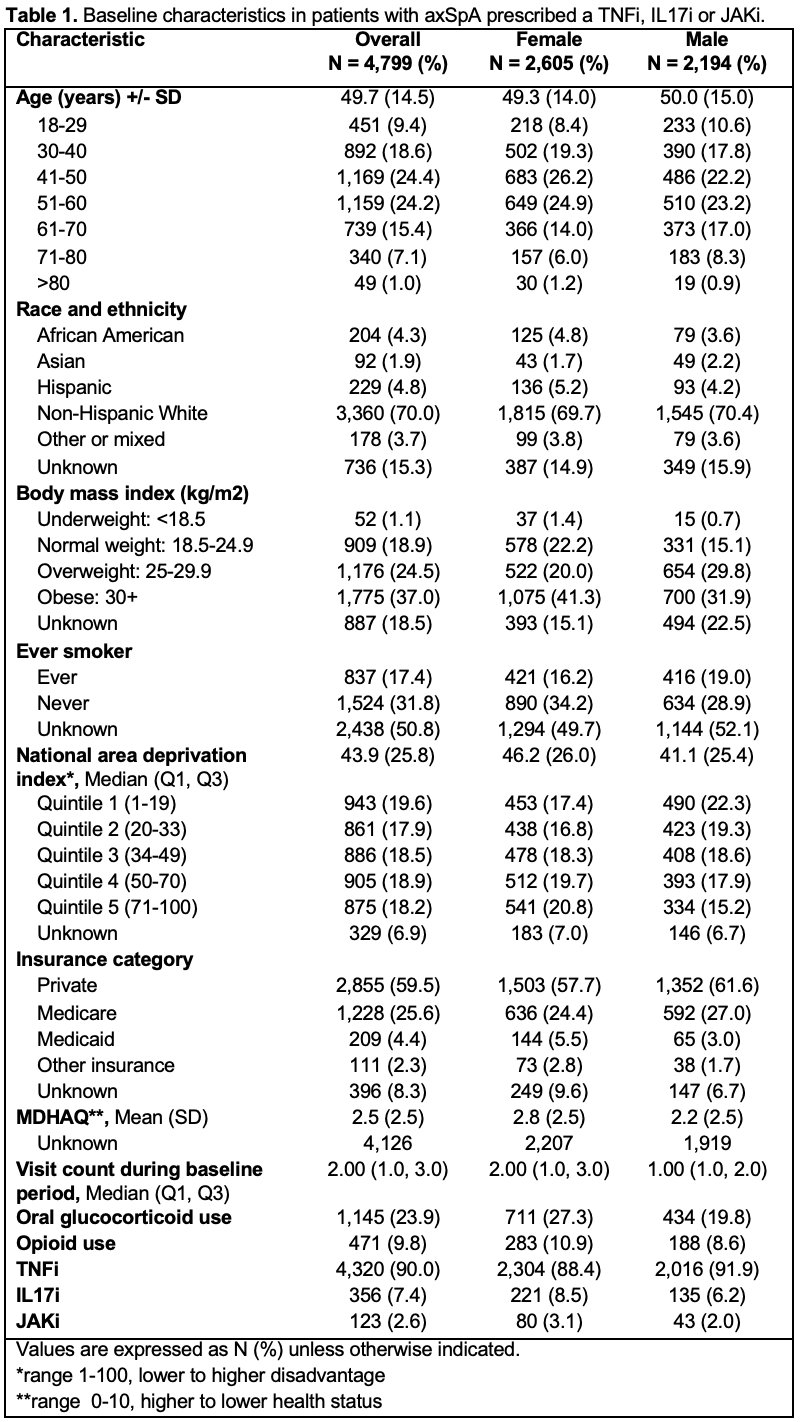Session Information
Session Type: Abstract Session
Session Time: 3:15PM-3:30PM
Background/Purpose: Women with axial spondyloarthritis (axSpA) tend to report worse outcomes and greater functional impairment than men. They may also respond less favorably to medication, though most data focus on tumor necrosis factor inhibitors (TNFi). Less is known about their response to interleukin-17 inhibitors (IL-17i) and Janus kinase inhibitors (JAKi), particularly in real-world settings. We assessed sex differences in medication discontinuation among U.S. adults with axSpA using the Rheumatology Informatics System for Effectiveness (RISE) registry.
Methods: We conducted a retrospective cohort study using RISE from 2000–2022, identifying new users of TNFi, IL-17i, and JAKi with axSpA. Patients had ≥2 consecutive prescriptions for the same drug. Discontinuation was defined as a stop date or >90-day gap without prescription (>60 days for infliximab). Cox proportional hazards models assessed sex differences in discontinuation, adjusting for demographics, body mass index, area deprivation index, insurance type, and visit frequency. Multiple imputation addressed missingness. Sensitivity analyses included requiring only 1 prescription, requiring medication stop dates, and adjusting for disease activity using the Multi-Dimensional Health Assessment Questionnaire (MDHAQ). We also examined drug continuation by sex and age (18–64 vs >65) using Kaplan Meier curves.
Results: Among 4,799 axSpA patients (mean age 49.7 years; 54.3% female), 90% used TNFi, 7.4% IL-17i, and 2.6% JAKi (Table 1). Women had a higher adjusted risk of TNFi discontinuation than men (Nf4,320, aHR 1.24, 95% CI: 1.15–1.35), which persisted across sensitivity models (Table 2). Adjustment for MDHAQ attenuated the association (aHR 1.16, 95% CI: 0.92–1.46). No significant sex differences were seen for IL-17i (Nf356, aHR 1.21, 95% CI: 0.92–1.60) or JAKi (Nf 123, aHR 0.89, 95% CI: 0.47–1.66), though sample sizes were small. Among TNFi users, women under 65 had the lowest probability of medication continuation (Figure). There were no differences by sex and age in the IL17i and JAKi groups.
Conclusion: In this national axSpA cohort, women were more likely than men to discontinue TNFi therapy. This was not observed for IL-17i or JAKi, and larger studies are needed to confirm these results. These findings highlight the importance of investigating sex-based differences in axSpA treatment response.
To cite this abstract in AMA style:
Stovall R, Blat C, Roberts E, Liew J, Wysham K, Singh N, Friedly J, Gensler L, Schmajuk g, Yazdany J. Sex differences in medication discontinuation in axial spondyloarthritis [abstract]. Arthritis Rheumatol. 2025; 77 (suppl 9). https://acrabstracts.org/abstract/sex-differences-in-medication-discontinuation-in-axial-spondyloarthritis/. Accessed .« Back to ACR Convergence 2025
ACR Meeting Abstracts - https://acrabstracts.org/abstract/sex-differences-in-medication-discontinuation-in-axial-spondyloarthritis/


.jpg)
.jpg)